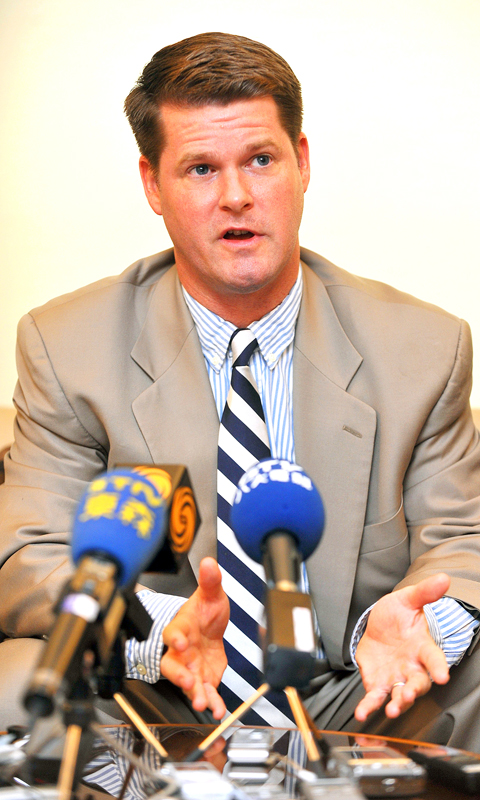|
¡@
China intent on annexation: Schriver
TAIWAN¡¦S SURVIVAL: The former US State Department official said that ties
with the US must remain strong, while democratic institutions need to be
strengthened
By Vincent Y. Chao
STAFF REPORTER
Wednesday, Jul 21, 2010, Page 3
¡§China has a strategy in cross-strait exchanges [that]
they are very explicit and clear about. They seek unification ¡K under the
principle of ¡¥one country, two systems¡¦ ... I think Taiwan¡¦s goals are somewhat
different.¡¨¡X Randall Schriver, former US deputy assistant secretary of state

Former US deputy assistant secretary of state
for East Asian and Pacific affairs Randall Schriver talks to the media in Taipei
yesterday.
PHOTO: LIU HSIN-DE, TAIPEI TIMES
A former senior US official said Taiwan must be ¡§sober-minded¡¨ about China¡¦s
intent because China clearly intends to annex Taiwan through growing
cross-strait relations.
¡§China has a strategy in cross-strait exchanges [that] they are very explicit
and clear about. They seek unification ¡K under the principle of ¡¥one country,
two systems,¡¦¡¨ former US deputy assistant secretary of state Randall Schriver
said.
¡§I think Taiwan¡¦s goals are somewhat different,¡¨ he said.
Speaking on the second day of a conference analyzing the regional implications
of China¡¦s rise, Schriver, who now heads the Project 2049 Institute, said Taiwan
must proceed with prudence in its cross-strait relationship.
He said two errors Taiwan could make in its exchanges with China were choosing a
cautious and reluctant path leading to deepening isolation, or proceeding too
quickly and ¡§[cutting] deals that are perhaps somewhat naive of China¡¦s intent.¡¨
His comments at the conferece ¡X titled ¡§A Rising Chinese Hegemony and Challenges
to the Region¡¨ ¡X come three weeks after Taiwan and China signed the landmark
Economic Cooperation Framework Agreement (ECFA) with China that will lower
customs tariffs and trade barriers between the two countries.
Schriver said that strengthening the US-Taiwan relationship and ties with other
regional neighbors should be seen as a priority, particularly after the ECFA.
This would create an important hedge for Taiwan if cross-strait exchanges were
to rapidly change, he said.
On Taiwan¡¦s democracy, he said it was important that the country continues to
strengthen and protect its democracy, as it was a recent development and could
potentially ¡§erode and lose ground.¡¨
¡§It¡¦s very important for Taiwan to continue to keep its democracy strong and
further perfect [it] ¡K because I think it relates to Taiwan¡¦s survival,¡¨ he
said.
During the forum, panelists also conveyed fears that China¡¦s growing global
influence could have a serious impact on regional stability and deep
ramifications for Taiwan¡¦s security.
Saying that Taiwan, Japan and the US should resist China¡¦s ¡§aggressive
diplomatic and military advances,¡¨ defense analyst Hideaki Kaneda said China
sought to create a ¡§multipolar world with China ¡K as a superpower like the US.¡¨
This could spell a worrying trend for Taiwan, as Beijing could leverage its
increasing diplomatic and economic power against Taiwan¡¦s sovereignty including
pressuring the US to scale down or stop arms sales to the country, said Taiwan¡¦s
former top representative to the US.
¡§We need more weapons for Taiwan¡¦s military defense ¡X to deter China, but it is
becoming more and more difficult to procure arms,¡¨ former Mainland Affairs
Council chairman Joseph Wu (§d°xÀè) said. ¡§I¡¦m concerned this will be the
precedent.¡¨
¡@
|
![]()
![]()
![]()